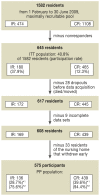Implementing an advance care planning program in German nursing homes: results of an inter-regionally controlled intervention trial
- PMID: 24612497
- PMCID: PMC3950824
- DOI: 10.3238/arztebl.2014.0050
Implementing an advance care planning program in German nursing homes: results of an inter-regionally controlled intervention trial
Abstract
Background: Advance Care Planning (ACP) is a systematic approach to ensure that effective advance directives (ADs) are developed and respected. We studied the effects of implementing a regional ACP program in Germany.
Methods: In a prospective, inter-regionally controlled trial focusing on nursing homes (n/hs), we compared the number, relevance and validity of new ADs completed in the intervention region versus the control region. Intervention n/h residents and their families were offered professional facilitation including standardized documentation.
Results: Data from 136 residents of three intervention n/hs were compared with data from 439 residents of 10 control n/hs over a study period of 16.5 months. In the intervention region, 49 (36.0%) participating residents completed a new AD over the period of the study, compared to 18 (4.1%) in the control region; these ADs included 30 ADs by proxy in the intervention region versus 10 in the control region. Proxies were designated in 94.7% versus 50.0% of cases, the AD was signed by a physician in 93.9% versus 16.7%, and an emergency order was included in 98.0% versus 44.4%. Resuscitation status was addressed in 95.9% versus 38.9% of cases (p<0.01 for all of the differences mentioned above). In the intervention region, new ADs were preceded by an average of 2.5 facilitated conversations (range, 2–5) with a mean total duration of 100 minutes (range, 60–240 minutes).
Conclusion: The implementation of an ACP program in German nursing homes led, much more frequently than previously reported, to the creation of advance directives with potential relevance to medical decision-making. Future research should assess the effect of such programs on clinical and structural outcomes.
Figures


Comment in
-
Patient advance directives in practice.Dtsch Arztebl Int. 2014 Jan 24;111(4):48-9. doi: 10.3238/arztebl.2014.0048. Dtsch Arztebl Int. 2014. PMID: 24612496 Free PMC article. No abstract available.
-
[Advance care planning: Results of implementation program in nursing homes].Enferm Clin. 2015 Nov-Dec;25(6):355-6. doi: 10.1016/j.enfcli.2015.10.001. Epub 2015 Nov 10. Enferm Clin. 2015. PMID: 26563594 Spanish. No abstract available.
References
-
- Emanuel LL, Barry MJ, Stoeckle JD, Ettelson LM, Emanuel EJ. Advance directives for medical care—a case for greater use. N Engl J Med. 1991;324:889–895. - PubMed
-
- Kutner L. Due process of euthanasia: the living will, a proposal. Indiana Law J. 1969 - PubMed
-
- Fagerlin A, Schneider CE. Enough. The failure of the living will. Hastings Cent Rep. 2004;34:30–42. - PubMed
-
- Evans N, Bausewein C, Menaca A, et al. A critical review of advance directives in Germany: attitudes, use and healthcare professionals’ compliance. Patient Educ Couns. 2012;87:277–288. - PubMed
Publication types
MeSH terms
LinkOut - more resources
Full Text Sources
Other Literature Sources
Medical

